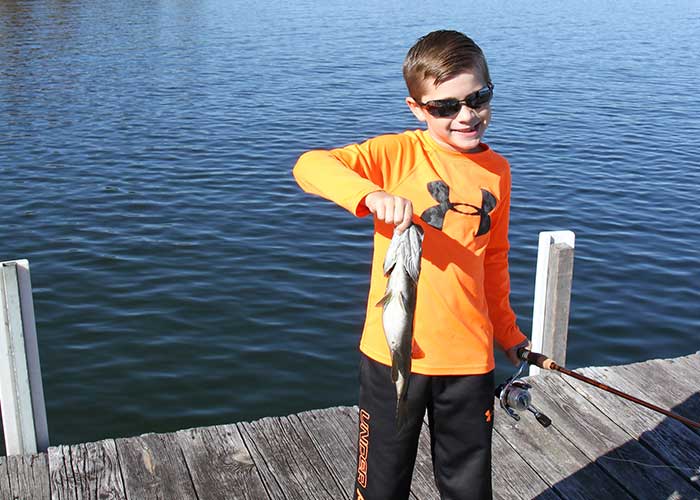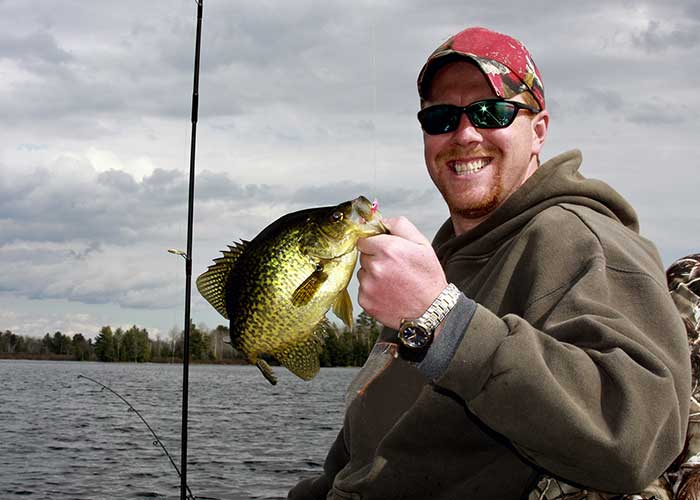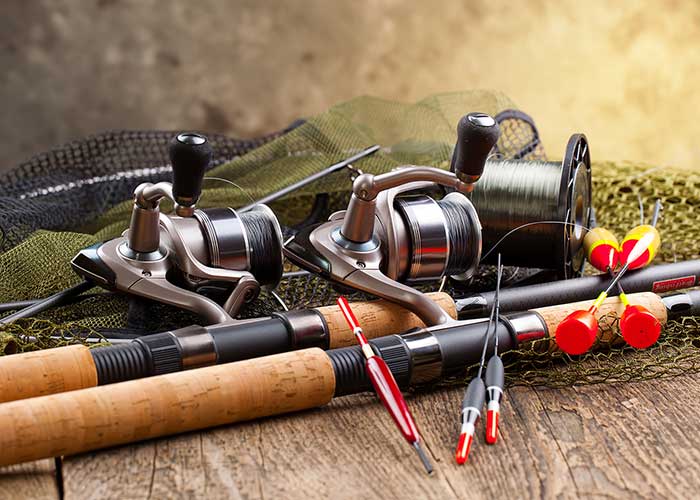

Fishing is the lure that attracts many visitors to Table Rock Lake. These fishing, pole-wielding visitors include recreational and competitive anglers alike. Table Rock Lake’s mild winters mean it never freezes, allowing for fishing for all skill levels throughout the year. With such a wide variety of fish species in the lake, you’ll need all the time you can get.
Before you cast a line into the water, check out the tips below on how and where to catch Table Rock Lake’s famous fish. All species listed below may be taken year-round, with the exception being paddlefish (or spoonbill, as they are often called).

By far the most popular gamefish on Table Rock Lake, anglers come from around the country and beyond to chase these fish referred to as black bass. Table Rock Lake is listed annually by national sources as one of the “Top 100 Bass Lakes” in the United States.
Black bass are found throughout the lake. Largemouth are often located in the back ends of creeks and coves, while smallmouth and spotted bass prefer the deeper water along the many channels within Table Rock Lake.
Bass spawn in April and May, which is when you’ll find even the largest bass in shallow water. Be stealthy—the water is clear and bass spook easily—and you’ll have an opportunity to catch a trophy bass. In the fall, bass follow their food source, minnows and crawdads, to the back of coves in shallow water to gorge before winter. During the summer and winter months, bass often school in deeper water where they can be harder to catch, so focus on spring and fall. Remember, black bass must be at least 15 inches long if you plan to keep them.


Also known as spoonbill because of the shape of the snout, this species has a short season and yields the biggest fish in the lake. The Missouri Department of Conservation certified the state record snagged at Table Rock Lake as weighing in at a whopping 140 pounds, 9 ounces. The daily limit is two paddlefish. The minimum legal body length for paddlefish at Table Rock Lake and its tributaries is 34 inches, measured from the eye to the fork of the tail.
The James River arm of the lake is the primary area within Table Rock Lake for paddlefish, specifically from the Highway 76 bridge at Cape Fair and up river toward Galena.
Paddlefish season runs from March 15 through April 30. Don’t forget to bring a big net!

Perhaps one of the most underrated fish in Table Rock Lake, both black and white crappie can be caught. Crappie must be at least 10 inches long to harvest from the lake.
Crappie are most abundant in the Long Creek and James River arms. There is also a good population in the Shell Knob area, where the Kings River enters the lake.
The best crappie fishing is in the spring and fall, and small plastic jigs (white or yellow) and minnows are effective for catching them when fished in the tops of submerged cedar trees. Crappie fishing is often very good during the winter months if you can locate deep brush piles—especially under docks that extend over deep water.


The feisty bluegill offers fun for all ages and is the easiest fish to catch. Although they are one of the smallest fish found in the lake, they put up a mighty fight when hooked.
You’ll find these colorful fish around pretty much the entire shoreline. Look around boat docks and underwater boulders. Bluegill are aggressive feeders, so all you need for bait is a container of nightcrawlers or a few hot dogs from your cooler.
Bluegill are very active during the hot summer months—great timing for youngsters visiting the lake. They feed throughout the day and offer hours of fun for kids of all ages.

Planning a fish fry? Table Rock Lake has an excellent catfish population, and the clean, clear waters provide some tasty table fare.
Channel and flathead catfish are found throughout the lake. The Indian Point area and shoreline near the dam both provide excellent bank fishing for old Mr. Whiskers. Like bluegill, catfish love hot dogs. Of course, there’s always the standard frozen chicken parts or stink bait if you prefer to go old school.
When the sun goes down, the catfish move to shallow water. Fish from sundown to sunrise for the best action. Just grab a chair (if bank fishing), throw out a line or two (you’re allowed multiple poles on Table Rock Lake), sit back and wait for the dip of the rod tip.
Table Rock Lake also offers good fishing for walleye, white bass and even rainbow trout. Recently, there has been a significant number of anglers bow fishing on Table Rock Lake for rough fish such as carp and drum.
While most of Table Rock Lake lies within the state of Missouri, the upper reaches of the Long Creek, Kings River, and White River arms stretch into Northern Arkansas. Make sure you are properly licensed for the water you are fishing.
All anglers—except Missouri residents 65 years of age or older or any person (resident or non-resident) 15 years of age or younger—must possess a valid fishing license.

The Missouri Department of Conservation and the Arkansas Game & Fish Commission have worked cooperatively to streamline regulations on shared waters to improve fishing. Missouri residents age 16 years and older who fish the Arkansas portions of Table Rock will no longer be required to purchase a non-resident Arkansas fishing license. Residents of Missouri and Arkansas who possess a valid resident fishing permit from their respective states may also purchase a $10 White River Border Lakes Permit.
For Missouri state regulations, please visit www.huntfish.mdc.mo.gov/fishing
For Arkansas state regulations, please visit www.agfc.com/en/fishing